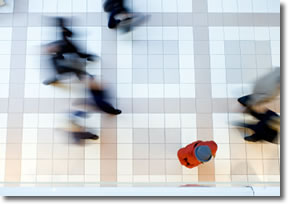In the Fullness of Time
Lessons from the Bible on living more slowly
 Some of us have
very busy lives and feel as though we are always in a hurry. Others may have had
to slow down for reasons outside their control and may feel some resentment, or
at least a slight sadness, at not being able to do as much or do it as fast as
was possible in the past.
Some of us have
very busy lives and feel as though we are always in a hurry. Others may have had
to slow down for reasons outside their control and may feel some resentment, or
at least a slight sadness, at not being able to do as much or do it as fast as
was possible in the past.
One of the reasons we find it difficult to slow down is that we have not become convinced of the need for things to occur “in the fullness of time.” We feel there is so much to accomplish and so few years in which to do it all that we've become addicted to instant everything. It probably started with instant mashed potatoes! Now there's instant food at drive-through windows, instant cash from an ATM, instant credit from all manner of stores, and instant information available online. We have lost the ability to let life unfold in its own time.
The Scriptural record, however, gives us another way to think about time. How long did Abraham and Sarah wait for the arrival of their promised heir, Isaac? God first revealed to Abraham that he would be the father of many nations when he called him to leave his country and go to the land God would show him. Abraham was 75 years old. Fifteen years later, when Abraham was 90, God renewed his promise. Ten years later, at age 100, Abraham and Sarah finally had their son. That’s a total of twenty-five years before “the fullness of time.”
How long did the Israelites wander through the desert after leaving Egypt on their way to the Promised Land? Forty long years. It certainly doesn't take 40 years to get from where they started in the Nile Delta to reach Jericho. I wonder if God felt they needed to slow down so they could really experience the “fullness of time.”
Think of old Simeon, the priest in the temple, who waited his whole life to see the promised Messiah. God had told him long before that he would not die until he had seen the Christ. Then when Mary and Joseph brought Jesus into the temple to be blessed, Simeon lifted him up and said, “Lord now let your servant depart in peace according to your word. For my eyes have seen your salvation, which you have prepared for all the world to see. A light to lighten the Gentiles and the hope of your people Israel.” The “fullness of time” had arrived.
How long did Jesus pray in the Garden of Gethsemane? Probably hours, yet hours that moved as slowly as a lifetime. But not until he was on the cross —in the fullness of time—could he say, “It is finished.”
After the horror and grief of Jesus’ death, how long did Mary and the disciples wait in pain? Three days, but days that lasted an eternity, as anyone knows who has lost a loved one.
How long did they wait for the coming of the Holy Spirit? Remember, Jesus had said to them, “I send the promise of my Father on you, but stay in Jerusalem until you have been clothed with power from on high.” How long did they wait for this mystery to occur? Fifty long days.
How long has the Church waited for Christ to come again? Although many have tried to define the actual moment at which it will happen, we continue to wait. We have waited more than 2,000 years, and we’ll continue to wait until the “fullness of time.”
The way of holiness is not achieved through hurriedness, busy-ness, or instant production. The way of God is the way of waiting.
So how, then, does this affect us in our daily lives? Donald Nicholl, a Roman Catholic lay theologian and professor, has these thoughts to offer us:
You don't notice the small things if you are moving fast. Suppose the person you most love is in a railroad station and you are looking for one another. If she stands still and you pass through the station at 100 miles per hour, you will not find each other.
He also wrote,
the gauge to the rush factor in one's life is the signature on a check or other papers. A hurried, illegible signature may mean one needs to slow down. A second of time will not make much difference and deliberately slowing down allows one to get into a proper rhythm for the day.
For those of us
who are rushing through our days at break-neck speed, an ordinary way of
becoming holy may simply be to practice slowing down. Do the dishes more slowly
in the morning, drive more slowly to work, handwrite a letter rather than
pushing buttons quickly on a computer, walk from your car into the store more
slowly, eat more slowly. These conscious acts
of slowing down, ready your spirit for the moments of grace, moments that we
might not see if we race by too swiftly.
Copyright © 2006 Renée
Miller